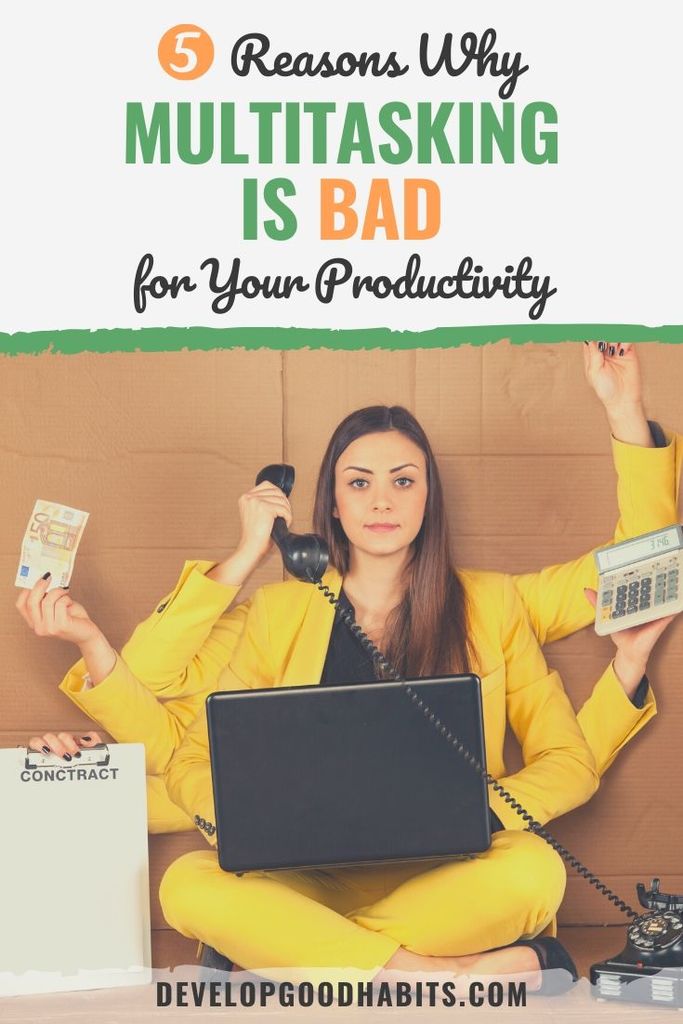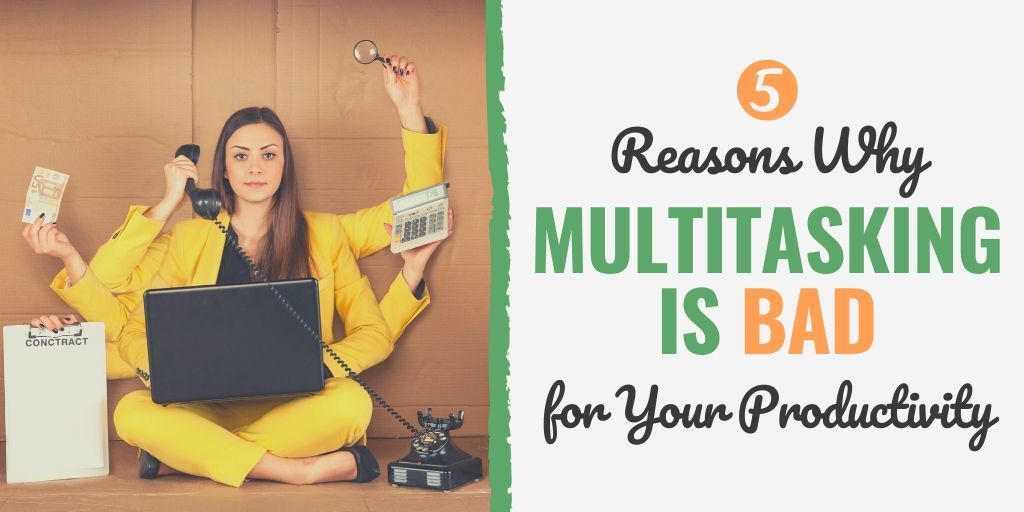There might be affiliate links on this page, which means we get a small commission of anything you buy. As an Amazon Associate we earn from qualifying purchases. Please do your own research before making any online purchase.
Ten years ago, I found that “multitasking” was a highly sought-after skill in the job market. When in interviews, I would always throw that buzzword out there so my potential employer would know that I could do the job of three people at one time.
That was one exaggeration in my job interviews, among others such as my “expert” level skills in Excel. But, I digress.
Fast forward to this past year and I was asked in an interview if I am good at multitasking. Because I was up-to-date on the research surrounding multitasking, I was a) surprised their interview questions weren’t more “modern” and b) eager to tell the truth by saying no.
As I answered with conviction, I could tell the lady interviewing me was taken aback.
I went on to explain my answer and noticed her eyes seemingly glazed over as I was talking. They clearly wanted to hire someone who could perform multiple tasks at one time, assuming that meant that those tasks would be done well.
I didn’t get that job, but I’ll consider that to be a win in the end.
In this article, I am going to explain further about what multitasking is, why the ability to multitask isn’t something to really brag about, and then provide you with five reasons why multitasking is a bad way to try to manage your time. So if you’re reading this on your phone as you’re driving, you may want to put your phone aside so you can pay full attention to what I’m about to tell you.
What is Multitasking?
People have been concurrently concentrating on multiple tasks since the beginning of time. However, the concept of “multitasking” wasn’t born until 1965, when it was used to describe the abilities of a computer system to process multiple tasks simultaneously. Now this didn’t necessarily mean that several tasks were happening at the exact same time, it simply meant that multiple tasks could be somewhere in the process of working and advancing all at once.
When later used to describe the activities of humans, multitasking came to be defined as a) performing more than one task at one time b) switching back and forth from one task to another c) performing several tasks in rapid succession.
Let’s look at some examples:
Is multitasking always completely detrimental? No. But, being able to determine the difference between when it may actually be helpful and when it poses a threat to your productivity is key. For example, no one is going to fault you for listening to some podcasts that focus on relevant research for an upcoming project while you’re going for a run. And when it comes to people who wait tables…that’s just a different level of multitasking that I will never be able to comprehend (especially wait staff who can memorize your entire table’s order without writing it down).
The key to determining what kind of multitasking isn’t going to put either task at risk is to combine activities that don’t use the same part of your brain and can complement (instead of distract from) each other. An example of this would be combining a mental and physical task, such as the aforementioned listening to a podcast while running.
But we aren’t here to talk about the exceptions to the rule. Let’s take a look at some reasons that computers may be designed to multitask, but the human brain is not.
5 Reasons Why Multitasking is Bad for Your Productivity
1. Multitasking Interferes With Brain Activity
Your prefrontal cortex is the area of your brain that is activated whenever you need to start paying attention to something. Both sides of your prefrontal cortex work together when you’re focusing on and carrying out a task, as they send signals to other areas of your brain.
Researchers in Paris at the Institut National de la Santé et de la Recherche Médicale (INSERM) discovered that when you add in another task, it requires each side of your brain to work alone. In their study, they asked participants to complete two tasks simultaneously while their brain function was being measured using an MRI. The results of the MRIs showed that when participants were given two tasks to perform simultaneously, the function of their brain split in half, which led to the participants forgetting details and making three times as many mistakes when compared to when they were focusing on just one task.
It’s important to remember that doing more than one natural task at the same time (such as talking and walking) is easier than trying to do more complicated tasks because natural tasks are less demanding on the prefrontal cortex.
2. Multitasking Can Impact Your IQ
A study done by neuroscientists at the University of London found (through MRI scans) that participants who engaged in multitasking while completing cognitive tasks had a decline in their IQ score that was similar to people who had stayed awake all night.
In fact, the researchers discovered that multitaskers had a reduced amount of density of gray matter in the anterior cingulate cortex area of their brain, which made sense of their observation of a decline in the participants’ cognitive performance. What’s more, this region of the brain is responsible for empathy and emotional control, which suggests that multitasking can reduce your ability to maintain control of your instincts in regards to your mood or personal relationships.
Some of the participants in this study who were asked to multitask experienced an IQ drop of 15 points, which left the group of multitaskers with an average IQ similar to that of an 8-year-old. This means that daily multitasking actually damages the brain, resulting in a drop in intelligence.
What’s more is that the researchers found that simply sitting close to someone who is multitasking can reduce your own comprehension by up to 17%. This is due to the distraction that can be caused by seeing someone else’s computer screen or actions, which leads your brain to have a need to interpret what you’re seeing. Surprisingly, this takes even more effort than it takes to try to multitask yourself.
Considering the fact that many companies have adjusted their offices to embrace an open-plan design to encourage collaboration among employees, this research suggests that, due to the negative impact that distractions and multitasking can have on one’s IQ, while having an open-plan office (which pretty much ensures that employees will be constantly multitasking–or be surrounded by it), was meant to make companies more successful, it may actually act as a hindrance to achieving that goal.
Clifford Nass, a professor at Stanford University, also conducted a study that suggested that multitasking weakens one’s cognitive abilities and brain function. He focused on three main areas in his study:
- The ability to discern relevant and irrelevant information
- The ability to remember the information at hand enough to be able to immediately recall it long after the task has been completed
- The response rate of switching back and forth between tasks
This findings of this study concluded that heavy multitaskers were attracted to irrelevant information, couldn’t recall information quickly after a task had been completed, and were slower at switching between tasks than those who focused on one thing at a time. Furthermore, there was no gender bias found in his study–men and women displayed equal results.
(A decrease in your cognitive abilities can lead you to make poor decisions. Learn about the common cognitive biases people have and how to spot them.)
3. Multitasking Can Kill Your Concentration
Clifford Nass’s research also found that multitasking on a regular basis not only wastes more time than it saves, but also there’s evidence that it can reduce one’s overall ability to concentrate and be creative.
To test for the possibility that some people may have an innate ability to multitask better than others, the researchers in this study grouped participants based on the frequency in which they engaged in multitasking and their belief as to whether or not doing multiple things at one time ultimately helped their performance. The researchers found that the participants who frequently multitask and believe that doing so boosts their performance were in fact worse at multitasking than the participants who preferred doing one thing at a time. This was because those who frequently engaged in multitasking were unable to effectively organize their thoughts and exclude irrelevant information, which hindered their ability to concentrate on any of the tasks that they were trying to accomplish. This group was also slower when it came to moving from one project to another.
The results of this study determined that multitasking reduces one’s efficiency and performance because our brains are only able to focus on one thing at any given time. When you try to take on more than this, your brain doesn’t have the capacity that is needed to successfully perform both tasks.
4. Multitasking Can Negatively Impact Your Brain’s Efficiency
As previously mentioned, the ability to perform multiple tasks at once was believed to be a professional strength in the past, however, a study published in the Journal of Experimental Psychology demonstrates that the amount of time it takes to shift mental gears every time you move between tasks greatly harms your efficiency.

To remedy this, you must allow your brain time to shift gears by consciously choosing to be finished with one process before moving onto the next. For example, if you’re working on financial reports at work and you also need to write a report, you have to engage in a mental shift from processing math to activating language rules before you can effectively start writing. It takes time for your brain to completely switch between cognitive processes, so trying to do this too often leads to inefficiency.
5. Multitasking Reduces Accuracy
One study published in the International Journal of Human-Computer Studies found that as multitasking increases, accuracy steadily decreases. Participants were separated into groups and tasked with solving problems under time constraints. Researchers compared the sub-groups, which included a high multitasking group, various levels of multitaskers, and participants who were only engaging in one task. They found that the high multitaskers consistently had the lowest accuracy scores than any other group. This finding suggests that the constant displacement of goals negatively impacts one’s performance.
Because of this, people working with information should keep the implications of multitasking in mind when it comes to their performance at work and consider paying attention to just one task at a time rather than increasing their levels of multitasking to a point where their performance declines. Trying to juggle multiple tasks can be risky if any performance mishaps in your industry can have serious consequences.
Furthermore, producing low-quality work will reduce your productivity because you will have to spend more time on it later when you have to go back and fix your mistakes.
Final Thoughts on Multitasking
While the cost of switching between tasks while talking to a friend and watching television probably won’t lead to any major problems, that same fraction of a second it takes to alter your focus could also determine the difference between life or death for someone who is texting and driving. While this is an extreme example, it shows that you can’t focus all of your attention on more than one thing at a time, which makes multitasking bad for your productivity.
Be mindful of your propensity to engage in more than one task at a time. The next time you realize that you’re multitasking when you’re trying to be productive, take a minute to assess the main objective that you’re trying to accomplish. This would be a good time to refer back to the 80/20 rule to help you identify your most important tasks. This way, you can get rid of any distractions and just focus on one task at a time.
If you need additional help determining which tasks on your to-do list should be a priority, using the Eisenhower Matrix can help you prioritize your tasks based on their urgency and level of importance. This tool also helps you identify tasks that you can either delegate or eliminate.
While there may always be a need to multitask in some way, unless you’re about to work efficiently, it doesn’t matter how many things you can do at once if you can’t complete any of it or the work you do is inaccurate or low-quality.

Connie Mathers is a professional editor and freelance writer. She holds a Bachelor's Degree in Marketing and a Master’s Degree in Social Work. When she is not writing, Connie is either spending time with her daughter and two dogs, running, or working at her full-time job as a social worker in Richmond, VA.


